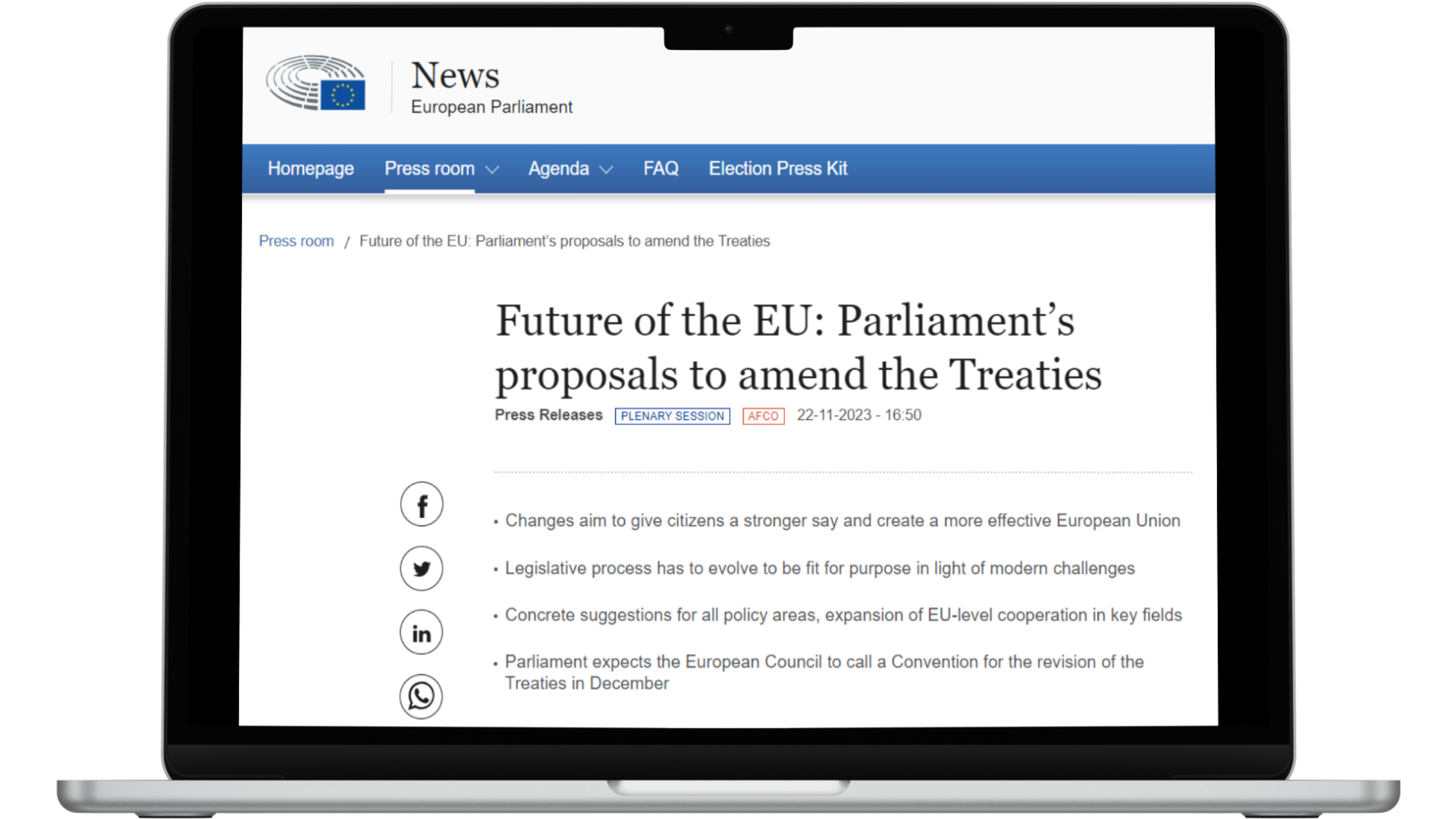LAST EUROPEAN LETTER
N. 80 June 2024 | European Elections 2024: the fight between European Federalists and Nationalists has just begun
The recently concluded European elections have been a real earthquake in the political balances of the Union and many member states. At an extraordinarily dramatic moment when war has returned to the Old Continent, and the well-being of our democracies is more threatened than ever by internal crises and external dangers, European citizens were called to express through their vote not only their support for a party but also a certain vision of what the future European Union will be like.
At first glance, the results may not seem so striking: after all, the majority that governed in the last legislature, composed of the Populars, Socialists, and Liberals, lost just about ten seats (still securing around 403 out of 720), and thus Ursula Von der Leyen will have a good chance of remaining President of the European Commission. She will probably seek the support of additional deputies on specific issues (starting with the absolute majority vote required for her re-election), but she will not need organic support from other parties, such as the Greens or the Eurosceptic Conservatives. Moreover, despite the ravings of many national politicians, no other majority is possible beyond that between the EPP, Renew Europe, and the Socialists.

Yet, there was a shock. In France, the far-right and anti-European Rassemblement National party came first with a result of almost 32% of the expressed votes, doubling the Europeanist presidential majority of President Macron, who reacted by calling early elections for the National Assembly in just under a month. In Germany, Alternative für Deutschland, despite scandals and clear neo-Nazi sympathies, obtained 16% of the votes, surpassing Chancellor Scholz’s SPD and becoming the most voted party in the East of the country. Overall, populist and Eurosceptic forces have grown everywhere in Europe, reaching almost a quarter of the elected members in the European Parliament. This is an undeniable and extremely dangerous trend. There is a growing part of public opinion ready to yield to the sirens of populists and extremists who, in their different forms (both right and left), are fundamentally united by their hostility towards the European unification project. If in previous decades this rejection translated into maximalist proposals, such as leaving the Union, abolishing the single currency, or dismantling supranational institutions, the new strategy of anti-European parties aims to reintroduce the Europe of nations where the selfish interests of individual states will prevail: this is a real sabotage of the European integration process from within, as the continuous use of national vetoes would make the Union essentially incapable of acting and advancing its policies.
The rise of Eurosceptic nationalism, which risks taking power in key countries such as France, cannot be fully understood if not read also in relation to the growing federalist drives animating the Europeanist camp. For a long time, traditional pro-European forces have been characterized by a certain lethargy, in the sense that they limited themselves to defending the already existing united Europe and promoting the idea of slow functionalist progress of integration. In recent years, however, the multiplication of internal and external enemies of the Union is forcing pro-European forces to reorient themselves and make a clear choice in favor of the European federation project. On the other hand, it is increasingly evident that the Union must strengthen itself and become capable of effectively serving its citizens if it wants to survive; otherwise, the risk is to succumb at the hands of anti-European forces that will win more and more elections, or to be crushed by autocratic powers, as the experience of the war in Ukraine is showing, and by global competition not only from China but also from the USA itself, as the Inflation Reduction Act proves.
In this sense, the treaty reform project supported by Europeanist forces in the outgoing European Parliament, already approved in plenary on November 22 and now stalled on the European Council’s table, waiting for heads of state and government to decide to convene a Convention by simple majority to discuss the contents of the reform, must be read.

The great change determined by the 2024 European elections is therefore this: the current Europe is no longer acceptable, and this fact is clear to most political forces in play, which nonetheless propose a transformation of the Union in one direction or another: to support the construction of a democratic European sovereignty, or to return to the Europe of small homelands, ready to make deals with the most arrogant external powers.
A frontal clash over the future of Europe has thus opened. On one side, nationalist forces are strengthening and trying to take power in more and more countries, even in France and Germany, which have long been the engine of the integration process. At the same time, the forces that believe in the European unification project, which are still strongly predominant in public opinion and in the new Strasbourg hemicycle, must advance the European federation project. For this reason, the new majority in the European Parliament must form around two non-negotiable positions, which must also be an indispensable condition for supporting the new Commission: military support for Ukraine in its war of resistance against Russian aggression and the will to reform the Treaties by taking up the baton of the outgoing legislature and fighting for convening the Convention. Making the Union sovereign is the only way to stop the project of democratic and civil regression, as well as surrender to external autocratic powers pursued by nationalist and anti-European forces.
